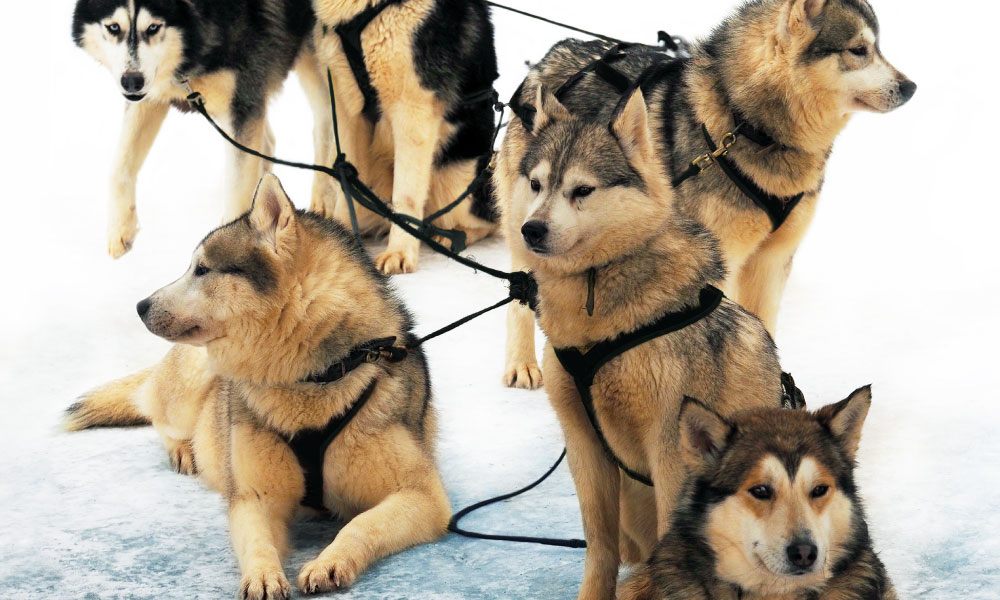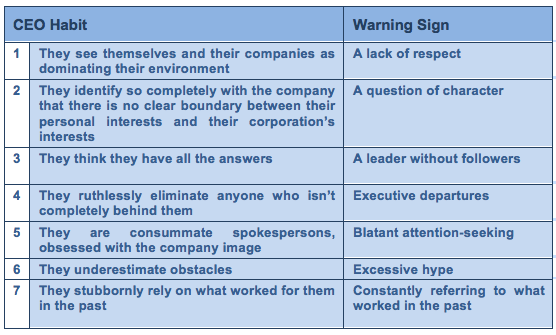
Knowing the Dogs from the Sled – A Cautionary Tale for CEO Recruiting
An article in Forbes “The Seven Habits of Spectacularly Unsuccessful Executives”, provides a great example of the danger of narcissism in the corner office. Virtually all the examples provided damned the CEO in terms of his or her focus upon herself, or on their purported market or industry expertise. As a consequence, CEOs will inevitably damn the company to a direction which perhaps once worked for the CEO, but isn’t likely to work again. This should be a cautionary lesson for Board members who may be contemplating an opportunity to fill a CEO or other senior leadership role within their organization.
Why? Because the narcissistic CEO is not open to the inputs and knowledge of his/her organization. The figure below shows in the left column the original observations made by Sydney Finklestein, (the Steven Roth Professor of Management at the Tuck School of Business at Dartmouth College, whose book “Why Smart Executives Fail” is the article’s point of reference), and in the right column, complements to these failures as provided by article author Eric Jackson of Forbes:
In Musher parlance, these would be examples of the Musher focused upon themselves or the sled, but not the dogs and the team.
Over the past several years, perhaps the majority of the past decade, I have observed the executive recruiting industry, and Boards they serve, consistently falling into a trap. Further, I think it begins to explain why CEO tenures are becoming briefer and briefer. When an executive opportunity opens up in a consumer packaged goods company, the marquee recruiters in the CPG industry are called and counseled. Rolodexes are spun, and the usual candidates from the same, or nearly the same, industry are contacted and recycled.
To follow the Musher metaphor, this all involves undue concern with the sled: the sled being the business, and its context — who knows whom, who is known to whom, who can make a phone call in the middle of the night about a merger and it gets answered.
But Boards don’t seem to be saying, “what are our challenges, and how can our people — with their knowledge, passion for the industry, and commitment to the company — be properly led to overcome them?”. This alternative view would provide a focus on a Musher who understands the dogs. Sleds do not move of their own accord. Mushers cannot move sleds (at least not far!). Only dogs, teams of dogs, can move the sled. A Musher that understands, who is committed to understanding dogs, and who is committed to unleashing their power, can move a sled optimally. So why isn’t there more focus on the managerial and leadership ability of executives in their recruitment?
During the pandemic, and now recession, “best athletes” or “people executives” were often passed over as candidates in favor of executives who had “deep industry expertise”. Statistics show that these recycled executives have under-produced, both in terms of competitiveness and results, and this will be reflected in their abbreviated tenures.
If you are Board member who witnesses some of the shortcomings listed above, ask yourself if your CEO is really capable of leading from the rear, of performing the hard work of motivating an organization to change and transform to become more competitive. If you are a Board member contemplating an opportunity to fill a CEO role, I encourage you to look for candidates who know how to properly organize, manage, lead, and inspire a workforce. You should be developing nuanced criteria to better glean candidates’ abilities along these lines. Worry less about how many years they were at XYZ Corporation, or how well they are known in your industry.
Find Mushers who know and love dogs.
New? Start here.
Stay in the Know
Sign-up to get our latest articles delivered right to your Inbox.
"*" indicates required fields




Once again, right on the mark. Of all the emails I receive, I consistently look for these Musher pep talks. good work Mr. Falter.